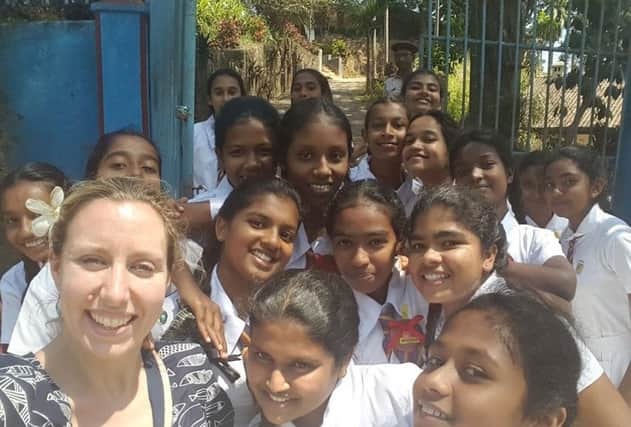FEATURE: Boston Grammar School makes new connections in Sri Lanka


The partnership came after staff from the Kadugannawa Central College, based 5,425 miles away, contacted the grammar school about working on a new British Council initiative called ‘Connecting Classrooms’.
And over the recent half term holiday head of geography Sarah Collinson and languages teacher Garance Boularand travelled to the school, near the Sri Lankan city of Kandy, to facilitate the first steps of the project.
Advertisement
Hide AdAdvertisement
Hide AdMrs Collinson said: “The aim of the partnership is to foster links between the two school communities, increase our pupils’ knowledge of different cultures and people, and for pupils to develop their skills in critical thinking and problem solving. Pupils in both schools will be working on a collaborative project based upon the topic of ‘Zero Hunger’, one of the United Nation’s global goals for sustainable development.


“Hunger affects millions of people all over the world on a daily basis, and pupils will be investigating the causes of and solutions to hunger issues in their own locality as well as further afield. The aim of the teacher visit was to plan the project in detail, get to know our partner school and compare education systems and practices.”
During the week’s stay they spent three working days in the Kadugannawa Central College, observing lessons and meeting students, parents and staff members. Another day was spent at the British Council headquarters in a joint conference with 11 other UK and Sri Lankan schools in the scheme.
“It was humbling to see how much the students in Sri Lanka value their education, and recognise the importance of it as a tool to secure a successful future,” Mrs Collinson added. “We were able to teach in collaboration with our colleagues in Kadugannawa, which was a real eye opener.
Advertisement
Hide AdAdvertisement
Hide Ad“Despite English being their second language, the students responded extremely well to our lessons on UK Geography. We taught the pupils about the 2013 Boston flood, and compared our region’s agricultural industry with that of Sri Lanka’s. The pupils were intrigued to find out about the people and buildings in Boston, and were surprised to learn about the miles of flat land compared to their rolling hills and tropical vegetation!


“In addition, Miss Boularand taught a class their very first French lesson.”
With so much technology now available in British schools to aid with teaching, the teachers from Boston Grammar said it was something they wouldn’t take for granted following their visit to Sri Lanka.
Mrs Collinson said: “A number of lessons there take place outside (much helped by the warmer climate), most classrooms have no windows, making them extremely noisy and challenging to teach in; resources were very scarce, with few pictures or posters on the classroom walls, and interactive whiteboards unheard of. It was interesting to learn of the many similarities in our school systems however.
Advertisement
Hide AdAdvertisement
Hide Ad“Teachers in Sri Lanka commented that they were commonly having to keep up with changes to education introduced by successive governments.


“We also discussed ways of stretching and challenging pupils, whilst also supporting those who struggle with literacy and written work.
“Our week in Sri Lanka was just the start of what we hope to be a long-lasting and successful partnership. We were welcomed into our partner school with open arms - both the staff and students couldn’t do enough for us. We learnt a considerable amount during the visit – which will certainly enhance our own teaching practice back in the UK.
“We will definitely not take for granted the tremendous amount of technology we have at our fingertips to help support our lessons. In the near future, we hope to fundraise to enable teachers from Sri Lanka to visit Boston Grammar School and experience school life in the UK.
Advertisement
Hide AdAdvertisement
Hide Ad“We feel incredibly lucky to have been given such an incredible opportunity to be involved in this project, and look forward to working with Boston Grammar School and Kadugannawa pupils on the Zero Hunger topic over the coming terms.”


Linking schools across the world Connecting Classrooms is a global education programme put together by the British Council (the UK’s international organisation for cultural relations and educational opportunities), in partnership with the Department for International Development (DFID).
It aims to help schools develop and network with thousands of teachers across the world with the view of helping young people develop the knowledge, skills and values to live and work in a globalised economy.
The scheme’s collaborative project templates are learning programmes on topical themes which can be used across the curriculum.